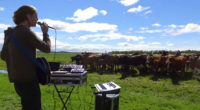
Iceland was the latest country to select its entry mere minutes ago, in a final with seven strong candidates and just as many potential winners. Eyþór Ingi Gunnlaugsson was the final choice to carry on a proud Eurovision tradition and defend the Icelandic honour in Malmö.
Gott kvöld, Ísland! The road to the Icelandic final tonight has been a considerably shorter one than in previous years, but none the less as enjoyable. The nation’s eyes now focus on Reykjavík as the selection reaches its culmination and the successor to last year’s victors Greta Salóme and Jónsi is chosen. We are welcomed back to the Harpa Concert Hall in the heart of the capital along with about 2.500 spectators for tonight’s celebration of Icelandic music
Former entrant Birgitta, who acheived an eight place for Iceland back in 2003 with Open Your Heart in Riga is back for another shot at victory. Söngvakeppni stalwart Magni takes his place among the final line up for a third consecutive year and his fifth time in the national selections, continuing his successful partnership with Sveinn Rúnar Sigurðsson. Adopted Icelander Jógvan Hansen is back for an equally impressive fourth attempt. Halli Reynis repeated his success from 2011, when suprising many by making the final with an understated entry.
The songs: (You can read more about the participants in our Get To Know article)
Song number 1: Magni Ásgeirsson – Ekki Líta Undan/Don’t Look Away (Music: Sveinn Rúnar Sigurðsson / Lyrics: Ingibjörg Gunnarsdóttir)
Rocker Magni opens the evening’s proceedings with a bang as he performs his thundering number Ekki Líta Undan. He had bizzarely failed to make the final until RÚV awarded him their wildcard and thank heavens for that, because the final needs artists of his calibre. OK, so the song might not be very experimental, but why not stick to what you’re good at? Not as instant as his previous two efforts, but nevertheless his entry is a handsome piece of adult rock. Erna Hrönn was still in the final, albeit as one of his three backing singers. Smoke and two spotlights against the darkened stage lit up Magni before his act got underway. He had the same outfit on as in the semis; a dark grey jacket paired with a white t-shirt and dark pants. A man playing the timpani was standing to his right. Magni definitely won the award for the most imaginative mic stand tonight, made out of chains that had somehow been stiffened! He was in fine voice as the guitar solo began and the stage came alive with flashes of light and circling camera shots. The backing vocalists could be heard very well. A confident, well performed opening act, but it somehow lacked the force that Magni normally projects.
Song number 2: Svavar Knútur Kristinsson and Hreindís Ylva Garðarsdóttir Hólm – Lífið Snýst /Life Goes On (Music: Hallgrímur Óskarsson / Lyrics: Hallgrímur Óskarsson & Svavar Knútur Kristinsson)
Svavar Knútur and Hreindís Ylva were next on stage and they floated into the final like a summer breeze with their upbeat slice of sunshine that is Lífið Snýst. With a childlike innocence in terms of melody, you can’t help but succumb to the charms of this jaunty little number with a hint of folk. Huge Persian rugs were scattered across the stage with a yellow light shining down on the couple. Svavar Knútur was dressed in a brown waistcoat/shirt combo with his hair in all directions. Hreindís Ylva had on what looked ike a schoolgirls’ dress in dark blue paired with white socks. They were backed by an accordionist, two guitarists and a drummer who provided a lively backdrop for the couple. Both gave passable vocal performances – let’s face it, their vocals won’t win them an oscar, but then they suited the song perfectly. They gave an enthusiastic performance of a song brimming over ith feelgood factor. If people are looking for quirky charm, then they’ll go for this one.
Song number 3: Eyþór Ingi Gunnlaugsson – Ég á Líf/I’ve Got a Life (Music & Lyrics : Örlygur Smári & Pétur Örn Guðmundsson)
Next up tonight is Eyþór with his anthemic celtic tinged love song, Ég á Líf. This has been a strong contender from the offset, it’s chances fancied by many. A simple, uncomplicated song that some may consider to be outdated and unoriginal in many respects, but that could be its strength with viewers identifying with the familiar.Stars against a black backdrop gave way to dry ice, setting the scene perfectly. Eyþór stood alone on stage, wearing a black jacket and shirt, with silver trim around the cuffs and lapelles. His performance was empassioned, with plenty of hand gestures and plenty of camera contact. Powerful beams blinded us temporarily before the song began its climb to its climax as the celtic fiddle kicked in. He did go a bit overboard on the vocals, coming across as a bit pompous now and then but they couldn’t be faulted, and the unbacked, stripped ending with just his voice was definitely a goosebump moment.
Song number 4: Birgitta Haukdal – Meðal Andanna/Among the Spirits
(Music: Birgitta Haukdal, Sylvía Haukdal Brynjarsdóttir & Jonas
Gladnikoff / Lyrics: Birgitta Haukdal, Sylvía Haukdal Brynjarsdóttir,
Michael James Down & Primoz Poglajen)
Fan favourite Birgitta is up next and naturally, there has been much anticipation prior to her performance. Her song is written by, amongst others, Eurovision veteran Jonas Gladnikoff. Meðal Andanna is another piece that is extremely formulaic, closely following a tried and tested recipe with all the right ingredients to push the buttons with the voting masses. She took to the stage wearing a floor length white dress, the back drop and stage completely blue with a silhouette of a landscape projected onto the backdrop. Smoke used again for dramatic effect. Her four backing singers dressed in monks robes also made for a great effect against the backdrop. She definitely has stage presence, and gave an intense performance with plenty of long glances into the camera. The wind machine kicked in at just the right moment, the key change came and Birgitta screeched the ending. Overproduced, the song comes across as rather calculated and unoriginal. Having said that, it does get stuck inside your head and so given Birgitta’s popularity, she has to be one of the challengers to lift the title tonight. Her performance almost brought the house down.
Song number 5: Jógvan Hansen & Stefanía Svavarsdóttir – Til Þín/For You (Music: Sveinn Rúnar Sigurðsson / Lyrics: Sveinn Rúnar Sigurðsson & Ágúst Ibsen)
Enter the second duo of the night, hoping to replicate the success of last years winners. Jógvan and Stefanía are performing the second entry in the final by Sveinn Rúnar Sigurðsson. An uplifting, appealling entry that once again is some ways Eurovision by numbers in its predictability. It would fit right into Melodifestivalen, with a somehow Swedish sound and structure, which is by no means a bad thing. What looked like pulsating light and waves against a black backdrop opened Til Þín. Jógvan was wearing a black tuxedo jacket with black pants and shirt and Stefanía the same two tone dress, as in her semi. The two gave a very comfortable performance, clearly enjoying themselves to the fullest. They walked back and forth across the stage before coming towards the centre and each other mid song. It was as if they were having a sing off at times, trying to outdo each other vocally. Both were faultless, giving a powerful show. Pure, enjoyable pop interspersed with a country-rock-pop chorus gives this entry the oomph it needs to stand out.
Song number 6: Halli Reynis – Vinátta/Friendship (Music & Lyrics: Haraldur Reynisson)
This is a tricky one to place. Halli is a professional and extremely competent performer, and did exactly what he did two years ago by making it to the final with an understated, unpretentious song. It plods along at a nice enough pace, has a pleasant melody that is easy on the ear with warming lyrics about dreams, love and gazing at the stars and such. It is very well structured, but will be possibly too anonymous to pose any kind of threat tonight. Halli sits perched on a bar stool in grey shirt and black waistcoat strumming his guitar. The same two female backing singers by his side do a brilliant job. A solid vocal set with a soft voice as mellow as honey. Candles all around them and a backdrop featuring a sunrise and moving onto flames give a relaxing air to the number. This was refreshingly free from any gimmicks and effects and made a nice contrast to the previous uptempo entry and the one coming next.
Song number 7: Unnur Eggertsdóttir – Ég Syng!/I’m Singing! (Music : Elíza Newman, Gísli Kristjánsson & Ken Rose / Lyrics: Eliza Newman, Gísli Kristjánsson & Hulda G. Geirsdóttir)
Unnur makes her debut in the Icelandic finals with this bouncy, cheeky slice of playful fun. She impressed in the semi finals with a great stage show, and combined with the draw of the song, the fact that this is one of a few uptempo numbers is what could make it stand out. Ég Syng! is the only finalist to have some sort of choreography too, which could work in its favour. Unnur entered the stage to screams from an adoring public, wearing an elegant red knee length dress paried with gold belt and shoes. Soft oranges blended with blacks and whites for this backdrop. Two dancers entered to accompany Unnur with her strenuous dance routine. Simultaneous singing and dancing is a risky business at the best of times, but she managed it with aplomb, making great use of the stage. Three female backing singers were at the side of the stage to lend vocal support. Unnur’s vocals were on the whole fine, if a little off pitch in parts and at one point towards the end they became extremely shaky. However, she really looked as if she was enjoying herself on stage and this obviously contributed to the party atmosphere.
The show:
The evening was opened by one half of last year’s duo, Greta Salóme performing A Thousand More Goodbyes. It didn’t take long before her trademark fiddle came into view. Wearing a simple, layered white dress she gave a very emotive performance, before the stage was plunged into darkness. Then a dancing couple entered the stage and we suddenly see the stage filled with a choir of at least twenty members at the sides and rear of the stage with Greta Salóme atop the same curved platform as seen in the semis. Yet another of the tracks from her album was performed, this time In The Silence.
Hosts Þórhallur Gunnarsson and Guðrún Dís Emilsdóttir were standing up in a balcony with a perfect view over the packed Harpa concert hall. Short interviews with each performer made up the postcards before each stage act, footage that was filmed during the preparations for tonight’s final. After song three, we were taken backstage to the green roon where both Magni and Svavar Knútur and Hreindís Ylva and finally Eyþór were interviewed briefly. Eyþór was in high spirits, clearly delighted with his performance. After all performances we had a chat show set up centre stage with Greta Salóme and Felix Bergsson, a member of the Iceland delegation at the last two Eurovision contests spoke of their experiences at Eurovision. The musical interval this yearwas a Eurovision kinder egg : three for the price of one – Selma, Friðrik Ómar and Regína Ósk performing a medley of Eurovision favourites including Making Your Mind Up, Ein Bißchen Frieden, Gente Di Mare and Selma giving a more than passable version of Euphoria. While we were waiting for the votes to be collated a second time, we were treated to an interview with Hera Björk.
The voting / result:
The voting was opened after a brief spell in the green room by a countdown from everyone present. A 50/50 combination of public and jury votes were used to determine which two acts would proceed to a duel and challenge each other for the honour of representing Iceland in Malmö. No votes were announced, only the two top placed songs were revealed; Eyþór Ingi Gunnlaugsson and Unnur Eggertsdóttir were the two artists that had managed to garner the most votes. Votes were then cancelled out and each song was performed again. The public then had only five minutes to cast their vote. Greta Salóme had the honour of bringing the envelope with the result on the stage and to hand over the trophy. Only televotes were used in the duel, with Eyþór Ingi Gunnlaugsson emerging as the triumphant winner.
Iceland at the Eurovision Song Contest:
One of the smallest countries in Europe, Iceland, has been a part of the
Eurovision family since their debut back in 1986 with Icy and Gleðibankinn. Since
then, broadcaster RÚV has sent many entries to Eurovision that,
although failing to make an impact have become firm fan favourites, such
as Páll Óskar and Minn Hinsti Dans with his daring presentation and choreography from 1997 or the little lady with the huge voice Sigga and her entry Nætur from 1994. We only have to go as far back as to 2009 to find the best Icelandic placing, which Jóhanna was responsible for, coming second with the melancholic ballad Is It True? Prior to that, Iceland have another silver medal as a result of Selma‘s joyous stage performance with All Out Of Luck
in 1999. Other than that, Iceland have three top ten placings to their
name and have qualified to the final for the last five years.
You might also like to read:



















